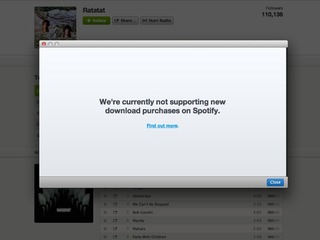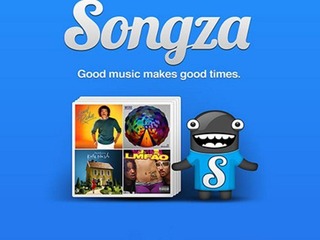Digital health funding declines for the third year in a row
AI-enabled digital health startups raised $3.7B, 37% of total funding for the sector
Read more...
Nothing beats a good music discovery app. As Apple’s App Store creeps closer to 50 billion apps downloaded altogether, Pandora remains the second most downloaded free app of all time (after Facebook). Now, one of its fiercest competitors—Spotify—is beefing up its own music discovery game with the acquisition of Tunigo.
A spokesperson for Spotify said that Tunigo has been a long-time partner of Spotify and has had a top 10 app on Spotify since the launch of its platform.
“The acquisition fits into our overall strategy around music discovery...basically helping our users make sense of over 20 million tracks,” the spokesperson said, adding that the Tunigo app will remain on Spotify.
The financial terms of the deal haven’t been disclosed, but all 20 of Tunigo’s employees will be reporting to Spotify’s offices in Stockholm and New York, according to AllThingsD.
Tunigo previously partnered with Spotify back in 2011 when Spotify opened up its platform to third party developers. The music discovery service allows users to subscribe to playlists according to mood, occasion, and so on. For example, mood playlists include angry, melancholic, psyched, happy, relaxed, and so on. There are also playlists for parties (dinner parties, theme parties, after parties, etc.), playlists for working out (running, at the gym), playlists for the club (house, techno, trance, etc.), and more.
Tunigo could be reached for comment, so it’s not clear how many users the service has and what kind of user base the company is bringing to Spotify.
Spotify launched in eight new markets last month, including Mexico, Hong Kong, Singapore, Estonia, Latvia, Lithuania, and Iceland, bringing the platform’s total to 28 markets altogether. The company has more than 24 million active users and over six million paid subscribers. Since its launch in 2008, Spotify says it’s driven more than $500 million to rights holders and expects to drive another $500 million in 2013.
Spotify and Pandora alike might have more to worry about soon, as Apple’s iRadio is reportedly progressing. Apple is expected to sign its first licensing agreement with Universal Music Group as early as next week. Along with Universal Music Group, Warner Music is also expected to sign with Apple. The service is expected to be similar to Pandora, with some slight differences, such as more on-demand features, which could make it competitive with not just Pandora, but Spotify and Rdio as well.
AI-enabled digital health startups raised $3.7B, 37% of total funding for the sector
Read more...OXcan combines proteomics and artificial intelligence for early detection
Read more...Nearly $265B in claims are denied every year because of the way they're coded
Read more...Startup/Business
Joined Vator on
Pandora, the leading internet radio service, gives people music they love
anytime, anywhere, through a wide variety of connected devices: laptop and
desktop computers, smartphones, connected BluRay players, connected TVs,
etc. Personalized stations launch instantly with the input of a single “seed” –
a favorite artist, song or genre. The Music Genome Project®, a deeply
detailed, hand-built musical taxonomy, powers the personalization or
Pandora. Using this musicological “DNA” and constant listener feedback
Pandora crafts personalized stations from the more than 800,000 songs that
have been analyzed since the project began in January 2000.
More than 75 million people throughout the United States listen to
personalized radio stations for free on Pandora through their PCs, mobile
phones and devices such as the iPad, and connected in-house devices
ranging from TVs to set-top boxes to Blu-Ray players. Mobile technology has
been a significant factor in the growth and popularity of Pandora, starting
with the introduction of the Apple app store for the iPhone in the summer of
2008. Pandora instantly became one of the most top downloaded apps and
today, according to Nielsen, is one of the top five most popular apps across
all smartphone platforms.
Pandora is free, simple and, thanks to connectivity, available everywhere
consumers are – at the office, at home, in the car and all points in between.
In 2009 the Company announced that Pandora would be incorporated into
the dashboard in Ford cars via SYNC technology; GM has already followed in
announcing plans to integrate Pandora into its vehicles and Mercedes-Benz
introduced their Media Interface Plus device that works with the
free Pandora iPhone app to provide direct control of Pandora from in-dash
stereo controls. This was all great news for the millions of Pandora listeners
who had been plugging their smartphones into car dashboards to listen to
personalized stations while driving. More than 50 percent of radio listening
happens in the car, making it a crucial arena for Pandora.
Today tens of millions of people have a deeply personal connection with
Pandora based on the delight of personalized radio listening and discovery.
These highly engaged listeners reinforce the value Pandora provides to: 1)
musicians, who have found in Pandora a level playing field on which their
music has a greater chance of being played than ever before; 2) advertisers,
who benefit from the multi-platform reach of Pandora, as well as its best
practices in targeting consumers for specific campaigns; 3) the music
industry, which has found in Pandora a highly effective distribution channel;
and 4) automobile and consumer electronics device manufacturers, who have
noted that incorporating Pandora into their product makes it more valuable
to consumers.
Pandora continues to focus on its business in the United States. The radio
arena has never been hotter, thanks to technology that enables radio to be
personalized to the individual and more accessible than ever before. Right
now millions of people listen to Pandora in the United States and we hope
someday to bring Pandora to billions of people around the world.
Timeline:
• 2000 – Tim Westergren’s Music Genome Project begins.
• 2005 – Pandora launches on the web.
• 2008 – Pandora app becomes one of the most consistently downloaded
apps in the Apple store.
• 2009 – Ford announces Pandora will be incorporated into car
dashboard. Alpine and Pioneer begin selling aftermarket radios that
connect to consumers’ iPhones and puts the control and command of
Pandora into the car dashboard.
• 2010 – Pandora is present on more than 200 connected consumer
electronics devices ranging from smartphones to TVs to set-top boxes
to Blu-ray players and is able to stream visual, audio, and interactive
advertising to computers, smartphones, iPads, and in-home connected
devices.




